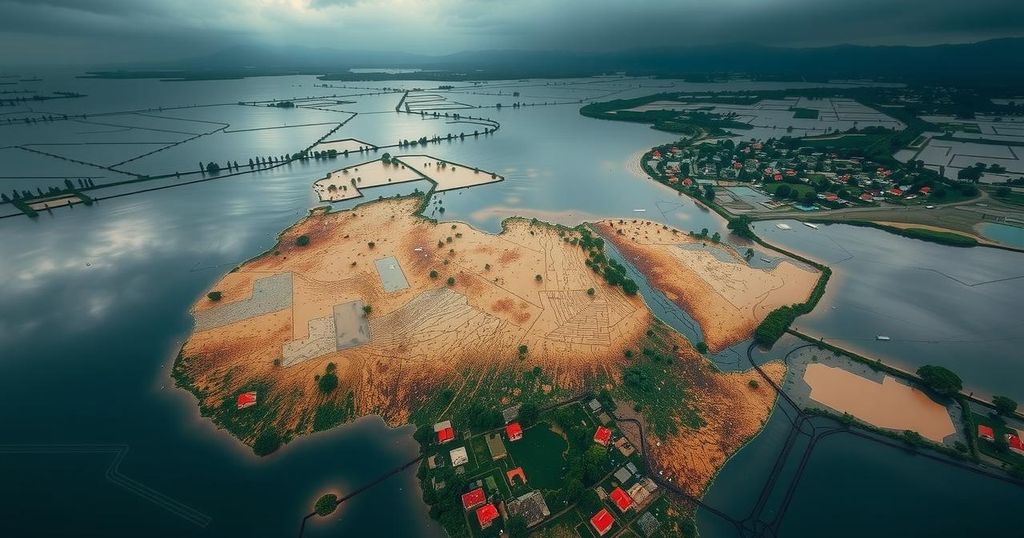The Dire Impacts of Global Warming: Flooding Crisis in Africa
In 2024, Africa is facing deadly floods exacerbated by global warming, with rainfall intensified by 5-20% due to human-induced climate change. Research indicates that such extreme weather has led to significant casualties and displacement, particularly in conflict-prone areas like Sudan. Experts urge an immediate transition away from fossil fuels to address these pressing issues, emphasizing the disproportionate impact of climate change on the continent despite its minimal emissions.
Recent studies reveal alarming implications of global warming on Africa, where this year’s intensified rainy season has led to devastating flooding, particularly across the Niger and Lake Chad basins. Research conducted by the World Weather Attribution (WWA) network indicates that human-induced climate change has exacerbated the severity of seasonal rainfall by 5-20%, creating significant humanitarian crises in the region. In 2024 alone, these floods have resulted in approximately 1,500 fatalities and the displacement of over one million people in West and Central Africa. Such extreme weather events exemplify the disproportionate impact of climate change on Africa, which, despite contributing minimally to global carbon emissions, bears the most severe consequences. Izidine Pinto, a researcher affiliated with the Royal Netherlands Meteorological Institute, highlighted that heavy summer rainfall patterns have emerged as the new norm for countries such as Sudan, Nigeria, and Chad. Pinto cautioned that with each incremental degree of warming, the probability of extreme flooding will escalate, urging a robust shift away from reliance on fossil fuels at the upcoming UN COP29 climate summit in Azerbaijan. The WWA warns that if global temperatures were to rise by two degrees Celsius above pre-industrial levels, such inundations could occur annually as early as the 2050s. The analysis conducted particularly assessed the situation in conflict-ridden Sudan, where climate change is aggravating the plight of millions already displaced by violence. Scientists emphasize the necessity for better dam maintenance and the establishment of comprehensive early warning systems to mitigate these calamities. The evidence indicates a growing urgency to address climate change and its impacts in Africa, particularly as the continent continues to experience the worst repercussions of weather extremes, despite its minimal contribution to global carbon output. Efforts to curtail climate change must prioritize transitioning away from fossil fuel dependency and implementing strategies to better prepare and protect vulnerable populations against the looming threats posed by climate change.
The article discusses the significant impact of global warming on Africa, highlighting how the region, despite being responsible for a minimal share of global carbon emissions, is experiencing extreme weather conditions resulting in humanitarian crises. The insights provided stem from research by the World Weather Attribution (WWA) network, which analyzes the relationship between human-induced climate change and weather phenomena. The data presented illustrates the worsening trends in rainfall patterns, leading to lethal flooding and widespread displacement within African nations, particularly in conflict-affected areas. The discourse looks into the intersection of climate change with socio-political issues, emphasizing the urgent need for global action and infrastructural improvements to address climate vulnerabilities.
In summary, the escalating severity of flooding in Africa, attributed to global warming, underscores the urgent need for international discussions and decisive action at climate summits. With extreme rainfall patterns affecting already vulnerable populations, the call for the cessation of fossil fuel use and enhanced climate resilience measures becomes increasingly critical. The evidence presented not only reflects the immediate dangers posed by climate change but also serves as a pressing reminder of the need for global solidarity and proactive strategies to safeguard the future of Africa against increasing weather extremes.
Original Source: www.aljazeera.com




Post Comment